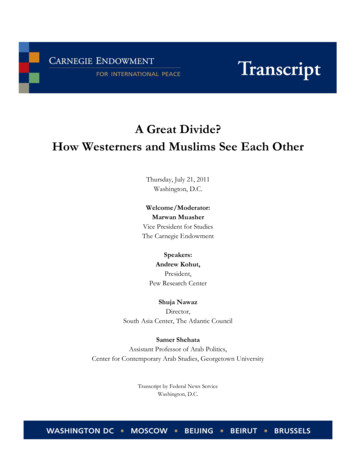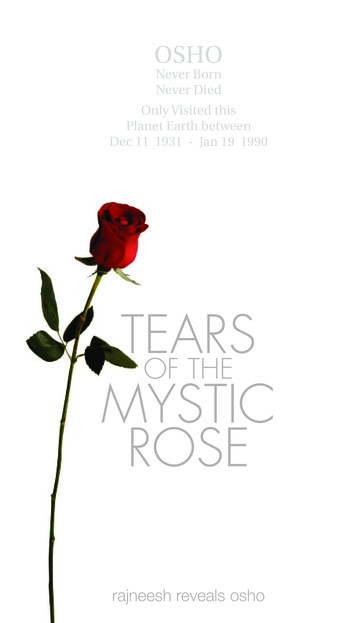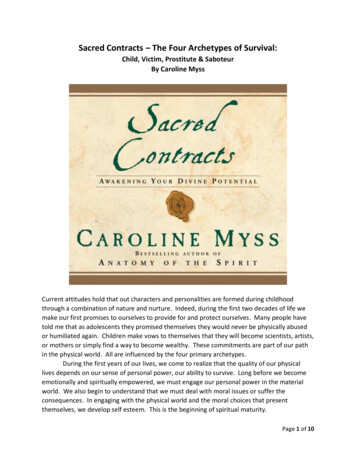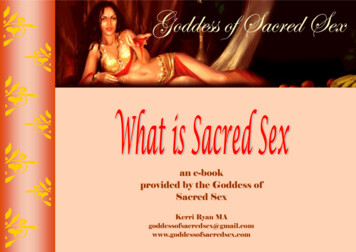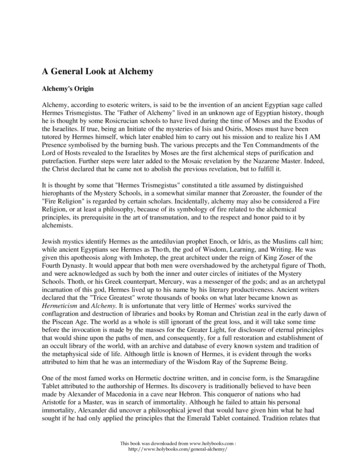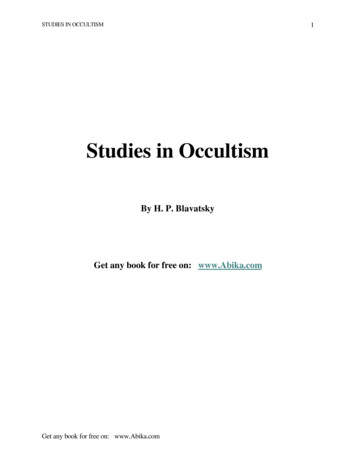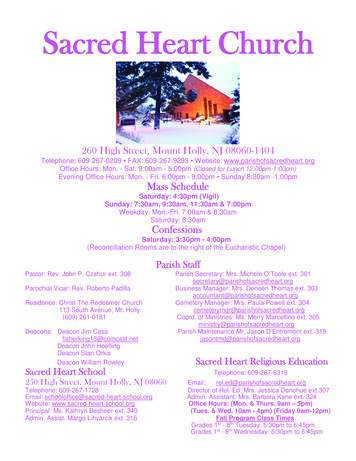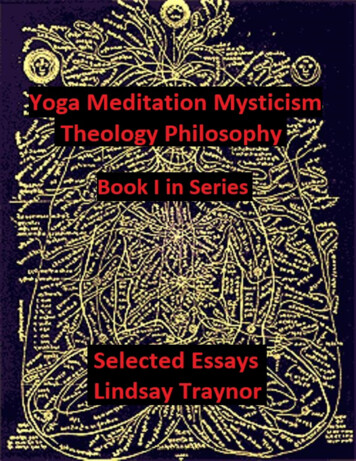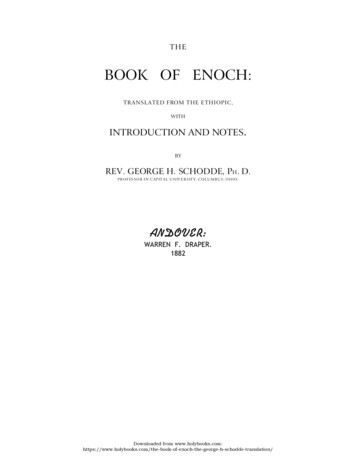
Transcription
THE SACRED BEETLE & OTHER GREAT ESSAYS IN SCIENCEChosen and Introduced by Martin GardnerFrom Darwin on evolution to Einstein on relativity covering subjects asdiverse as science and literature, the sea, the laws of physics, the beautifulwoman, logic, the bee, and the moon, this is a lively and lucid collection ofessays by thirty-two leading interpreters of science. The essays are drawntogether and provided with an entertaining and perceptive commentary byMartin Gardner, who explains that his selection was governed not by adesire to teach, or to bring us up to date on new trends and discoveries, but'to spread before the reader, whether his interest in science be passionate ormild, a sumptuous feast of great writing--absorbing, thought-disturbingpieces that have something important to say about science and say it forciblyand well'. His explanatory and biographical sketches make this book notonly a rich collection of good reading, but also an informal history of thepeople and ideas that have shaped our culture and moulded our everydaylives. Martin Gardner is a mathematician whose numerous books on science,mathematics, and philosophy include Science: Good, Bad and Bogus andOrder and Surprise (both available in Oxford Paperbacks). In 1983 he wasnamed Science Writer of the Year by the American Institute of Physics.ContentsFRANCIS BACONThe Sphinx (1609)CHARLES DARWINRecapitulation and Conclusion (1859)JOHN DEWEYThe Influence of Darwinism on Philosophy (1909)STEPHEN JAY GOULDNonmoral Nature (1982)WILLIAM JAMESThe Problem of Being (1911)HAVELOCK ELLISWhat Makes a Woman Beautiful (1905)JEAN HENRI FABREThe Sacred Beetle (1918)GILBERT KEITH CHESTERTONThe Logic of Elfland (1908)
CARL SAGANCan We Know The Universe?Reflections on a Grain of Salt ( 1979)JOSEPH WOOD KRUTCHThe Colloid and the Crystal (1950)JOSE ORTEGA Y GASSETThe Barbarism of "Specialization" (1932)THOMAS HENRY HUXLEYScience and Culture (1893)JOHN BURROUGHS Science and Literature (1889)ISAAC ASIMOVScience and Beauty (1983)ERNEST NAGELAutomation (1955)JONATHAN NORTON LEONARDOther-Worldly Life (1953)J. ROBERT OPPENHEIMERPhysics in the Contemporary World (1955)ALFRED NORTH WHITEHEADReligion and Science (1925)JOHN DOS PASSOSProteus (1930)JULIAN HUXLEYAn Essay on Bird-Mind (1923)ARTHUR STANLEY EDDINGTONThe Decline of Determinism ( 1934 )ALDOUS HUXLEYScience in the Brave New World (1932)RACHEL CARSONThe Sunless Sea (1951)MAURICE MAETERLINCKThe Nuptial Flight (1901)H. G. WELLSThe New Source of Energy (1914)Science and Ultimate Truth (1931)LAURA FERMISuccess (1954)SAMUEL GOUDSMITThe Gestapo in Science (1947)ROBERT LOUIS STEVENSON
Pan's Pipes (1876)SIGMUND FREUDDreams of the Death of Beloved Persons ( 1900)BERTRAND RUSSELLThe Science to Save Us from Science (1950)The Greatness of Albert Einstein (1955)ALBERT EINSTEINE mc2 (1946)LEWIS THOMASSeven Wonders (1983)PrefaceIN 1955 Herbert Alexander, then president of Pocket Books, asked me toedit an anthology to be titled Great Essays in Science. The paperback edition(it never saw hard covers) came out in 1957. This expanded and revisededition, with its new title, brings the book back in print after a lapse of morethan a decade.Most of the small changes made in the introductions have beenoccasioned by the deaths of contributors. The computer revolution hasmoved much faster than anyone anticipated when Ernest Nagel wrote aboutautomation, but I am allowing that essay to remain, with my introductionunaltered, because the coming of the industrial robots has made Nagel'spiece as timely and as accurate as it was in 1957.The only selection I removed was a long chapter on the moon that firstappeared in Sir Robert Ball's classic work of 1885, The Story of theHeavens. Although this chapter was written more than seventy years before Iput it in my anthology, it contained surprisingly little that was then out ofdate, and indeed one can still learn much from it. "Significant newknowledge." I wrote in my introduction, "will have to wait upon the firstlunar explorers." I was right in predicting that "soon the artificial satelliteswill be whirling around the earth" and that the moon is "certain to be the firstspot visited by our spacemen." Unfortunately, I added another guess thatwas far too cautious. "Our children." I wrote, "may well live to see a rocketship circle or land on the moon and return."Four new essays have been added. I wish there could have been more, butthe size of a book is limited and I decided with reluctance to limit mychoices to essays by four Americans who began their distinguished sciencewriting careers after the date of the first edition of this collection: IsaacAsimov, Stephen Jay Could, Carl Sagan. and Lewis Thomas. By an
astonishing coincidence, all four of these men grew up in Brooklyn! I like tothink of the Brooklyn Bridge as a giant symbol of the joining of C. P.Snow's "two cultures." It is a bridge that all four writers travel back and forthin their books as easily and often as they must have once travelled back andforth between Manhattan and Brooklyn.As I said in my original preface, I had hoped that every major branch ofscience might be represented in this anthology, but it was not possible.Medicine and the social sciences, for example. are not here, although manyof the book's essays raise momentous political questions.A limit also had to be placed on the age of the selections. For manyreasons I decided to include nothing published earlier than 1859, the pivotalyear of Darwin's Origin of Species. (The prologue by Francis Bacon is thesole exception.) Only the piece by Havelock Ellis has been cut. The othersare reprinted in full, with no textual alterations.As a literary form the essay has always had irresponsible boundaries, andin this collection its definition becomes no clearer. There are "essays" herethat are chapters, or segments from chapters, not written to be read apartfrom the book in which they first appeared. Several were originally lectures.Two are from works of fiction. Some are brief enough to be called sketches,others long enough to be called treatises. Some are heavy with scientificerudition, others glance at science casually over a shoulder. Some arewandering, informal expressions of opinion; others labour a thesis with thesystematic vigour of a medieval schoolman. Even the cardinal rule that agreat essay must be beautifully written has been violated in one or twoinstances.Nothing could be further from my intent than to hand the reader a volumedesigned primarily to teach him science or bring him up to date on the latesttrends and discoveries. There is no end to the making of such anthologiesand even the best of them have a distressing way of becoming out of datebefore the pages are bound. Rather, the purpose of this book is to spreadbefore the reader, whether his or her interest in science be passionate ormild, a sumptuous feast of great writing--absorbing, thought-disturbingpieces that have some- thing important to say about science and say itforcibly and well.Martin Gardner
PrologueFRANCIS BACONThe SphinxSPHINX, says the story, was a monster combining many shapes in one.She had the face and voice of a virgin, the wings of a bird, the claws of agriffin. She dwelt on the ridge of a mountain near Thebes and infested theroads, lying in ambush for travellers, whom she would suddenly attack andlay hold of; and when she had mattered them, she propounded to themcertain dark and perplexing riddles, which she was thought to have obtainedfrom the Muses. And if the wretched captives could not at once solve andinterpret the same, as they stood hesitating and confused she cruelly tornthem to pieces. Time bringing no abatement of the calamity, the Thebansoffered to any man who should expound the Sphinx's riddles (for this wasthe only way to subdue her) the sovereignty of Thebes as his reward. Thegreatness of the prize induced (Edipus, a man of wisdom and penetration,but lame from wounds in his feet, to accept the condition and make the trial:who presenting himself full of confidence and alacrity before the Sphinx,and being asked what kind of animal it was which was born four-footed,afterwards became two- footed, then three-footed, and at last four-footedagain, answered readily that it was man; who at his birth and during hisinfancy sprawls on all fours, hardly attempting to creep; in a little whilewalks upright on two feet; in later years leans on a walking-stick and so goesas it were on three; and at last in extreme age and decrepitude, his sinews allfailing, sinks into a quadruped again, and keeps his bed. This was the rightanswer and gave him the victory; whereupon he slew the Sphinx; whosebody was put on the back of an ass and carried about in triumph; whilehimself war made according to compact King of Thebes.The fable is an elegant and a wise one, invented apparently in allusion toScience; especially in its application to practical life. Science, being thewonder of the ignorant and unskilful, may be not absurdly caned a monster.In figure and aspect it is represented as many-shaped, in illusion to theimmense variety of matter with which it deals. It is said to have the face andvoice of a woman, in respect of its beauty and facility of utterance. Wingsare added because the sciences and the discoveries of science spread and 9·abroad in on instant; the communication of knowledge being like that of onecandle with another, which lights up at once, Claws, sharp and hooked, areascribed to it with great elegance, because the axioms and arguments ofscience penetrate and hold fast the mind, so that it has no means of evasion
or escape; a point which the sacred philosopher also noted: The words of thewise are as goads, and as nails driven deep in. Again, all knowledge may beregarded as having its station on the heights of mountains; for it isdeservedly esteemed a thing sublime and lofty, which looks down uponignorance as from an eminence, and has moreover a spacious prospect onevery side, such as we find on hill-tops. It is described as infesting the roads,because at every turn in the journey or pilgrimage of human life, matter andoccasion for study assails and encounters us. Again Sphinx proposes to mena variety of hard questions and riddles which she received from the Muses.In these, while they remain with the Muses, there is probably no cruelty; forso long as the object of meditation and inquiry is merely to know, theunderstanding is not oppressed or straitened by it, but is free to wander andexpatiate, and finds in the very uncertainty of conclusion and variety ofchoice a certain pleasure and delight; but when they pass from the Muses toSphinx, that is from contemplation to practice, whereby there is necessity forpresent action, choice, and decision, then they begin to be painful and cruel;and un- less they be solved and disposed of they strangely torment andworry the mind, pulling it first this way and then that, and fairly tearing it topieces. Moreover the riddles of the Sphinx have always a twofold conditionattached to them; distraction and laceration of mind, if you fail to solvethem; if you succeed, a kingdom. For he who understands his subject ismaster of his end; and every workman is king over his work.Now of the Sphinx's riddles there are in all two kinds; one concerning thenature of things, another concerning the nature of man; and in like mannerthere are two kinds of kingdom offered as the reward of solving them; oneover nature, and the other over man. For the command over things natural,over bodies, medicines, mechanical powers, and infinite other of the kind-isthe one proper and ultimate end of true natural philosophy; however thephilosophy of the School, content with what it finds, and swelling with talk,may neglect or spurn the search after realities and works. But the riddleproposed to Edipus, by the solution of which he became King of Thebes,related to the nature of man; for whoever has a thorough insight into thenature of man may shape his fortune almost as he will, and is horn forempire; as was well declared concerning the arts of the Romans,Be thine the art,O Rome, with government to rule the nations,And to know whom to spare and whom to abate,And settle the condition of the world.
And therefore it fell out happily that Augustus Caesar, whether onpurpose or by chance, used a Sphinx for his seal. For he certainly excelled inthe art of politics if ever man did; and succeeded in the course of his life insolving most happily a great many new riddles concerning the nature ofman, which if he had not dexterously and readily answered he would manytimes have been in imminent danger of destruction. The fable adds veryprettily that when the Sphinx was subdued, her body was laid on the back ofan ass: for there is nothing so subtle and abstruse, but when it is oncethoroughly understood and published to the world, even a dull wit can carryit. Nor is that other point to be passed over, that the Sphinx was subdued bya lame man with club feet; for men generally proceed too fast and in toogreat a hurry to the solution of the Sphinx's riddles; whence it follows thatthe Sphinx has the better of them, and instead of obtaining the sovereigntyby works and effects, they only distract and worry their minds withdisputations.
CHARLES DARWIN‘AT LAST gleams of light have come," Darwin wrote in 1844 to a friend,"and 1 am almost convinced (quite contrary to the opinion I started with)that species are not (it is like confessing a murder) immutable."Charles Darwin (1809-1882) was a man of extraordinary patience andhumility. "Almost convinced," he wrote, and this after more than ten yearsof painstaking labour in the gathering of relevant facts, and fourteen yearsbefore he felt compelled to publish his views! The theory of evolution hadbeen pro- pounded before; but not until Darwin issued his Origin of Species,in 1859, had such a mountainous mass of evidence been brought togetherinto one orderly, irrefutable argu
science penetrate and hold fast the mind, so that it has no means of evasion . or escape; a point which the sacred philosopher also noted: The words of the wise are as goads, and as nails driven deep in. Again, all knowledge may be regarded as having its station on the heights of mountains; for it is deservedly esteemed a thing sublime and lofty, which looks down upon ignorance as from an .
